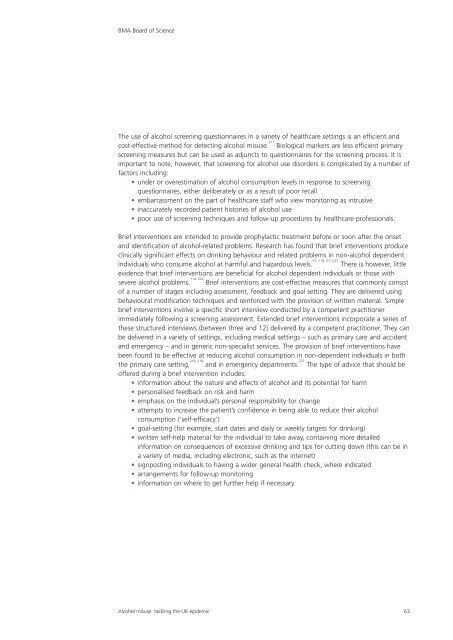Alcohol misuse: tackling the UK epidemic - London
Alcohol misuse: tackling the UK epidemic - London
Alcohol misuse: tackling the UK epidemic - London
Create successful ePaper yourself
Turn your PDF publications into a flip-book with our unique Google optimized e-Paper software.
BMA Board of Science<br />
The use of alcohol screening questionnaires in a variety of healthcare settings is an efficient and<br />
cost-effective method for detecting alcohol <strong>misuse</strong>. 217<br />
Biological markers are less efficient primary<br />
screening measures but can be used as adjuncts to questionnaires for <strong>the</strong> screening process. It is<br />
important to note, however, that screening for alcohol use disorders is complicated by a number of<br />
factors including:<br />
under or overestimation of alcohol consumption levels in response to screening<br />
questionnaires, ei<strong>the</strong>r deliberately or as a result of poor recall<br />
embarrassment on <strong>the</strong> part of healthcare staff who view monitoring as intrusive<br />
inaccurately recorded patient histories of alcohol use<br />
poor use of screening techniques and follow-up procedures by healthcare professionals.<br />
Brief interventions are intended to provide prophylactic treatment before or soon after <strong>the</strong> onset<br />
and identification of alcohol-related problems. Research has found that brief interventions produce<br />
clinically significant effects on drinking behaviour and related problems in non-alcohol dependent<br />
57, 114, 217-221<br />
individuals who consume alcohol at harmful and hazardous levels. There is however, little<br />
evidence that brief interventions are beneficial for alcohol dependent individuals or those with<br />
114, 222<br />
severe alcohol problems. Brief interventions are cost-effective measures that commonly consist<br />
of a number of stages including assessment, feedback and goal setting. They are delivered using<br />
behavioural modification techniques and reinforced with <strong>the</strong> provision of written material. Simple<br />
brief interventions involve a specific short interview conducted by a competent practitioner<br />
immediately following a screening assessment. Extended brief interventions incorporate a series of<br />
<strong>the</strong>se structured interviews (between three and 12) delivered by a competent practitioner. They can<br />
be delivered in a variety of settings, including medical settings – such as primary care and accident<br />
and emergency – and in generic non-specialist services. The provision of brief interventions have<br />
been found to be effective at reducing alcohol consumption in non-dependent individuals in both<br />
218, 219<br />
<strong>the</strong> primary care setting, and in emergency departments. 223<br />
The type of advice that should be<br />
offered during a brief intervention includes:<br />
information about <strong>the</strong> nature and effects of alcohol and its potential for harm<br />
personalised feedback on risk and harm<br />
emphasis on <strong>the</strong> individual’s personal responsibility for change<br />
attempts to increase <strong>the</strong> patient’s confidence in being able to reduce <strong>the</strong>ir alcohol<br />
consumption (‘self-efficacy’)<br />
goal-setting (for example, start dates and daily or weekly targets for drinking)<br />
written self-help material for <strong>the</strong> individual to take away, containing more detailed<br />
information on consequences of excessive drinking and tips for cutting down (this can be in<br />
a variety of media, including electronic, such as <strong>the</strong> internet)<br />
signposting individuals to having a wider general health check, where indicated<br />
arrangements for follow-up monitoring<br />
information on where to get fur<strong>the</strong>r help if necessary.<br />
<strong>Alcohol</strong> <strong>misuse</strong>: <strong>tackling</strong> <strong>the</strong> <strong>UK</strong> <strong>epidemic</strong> 63
















